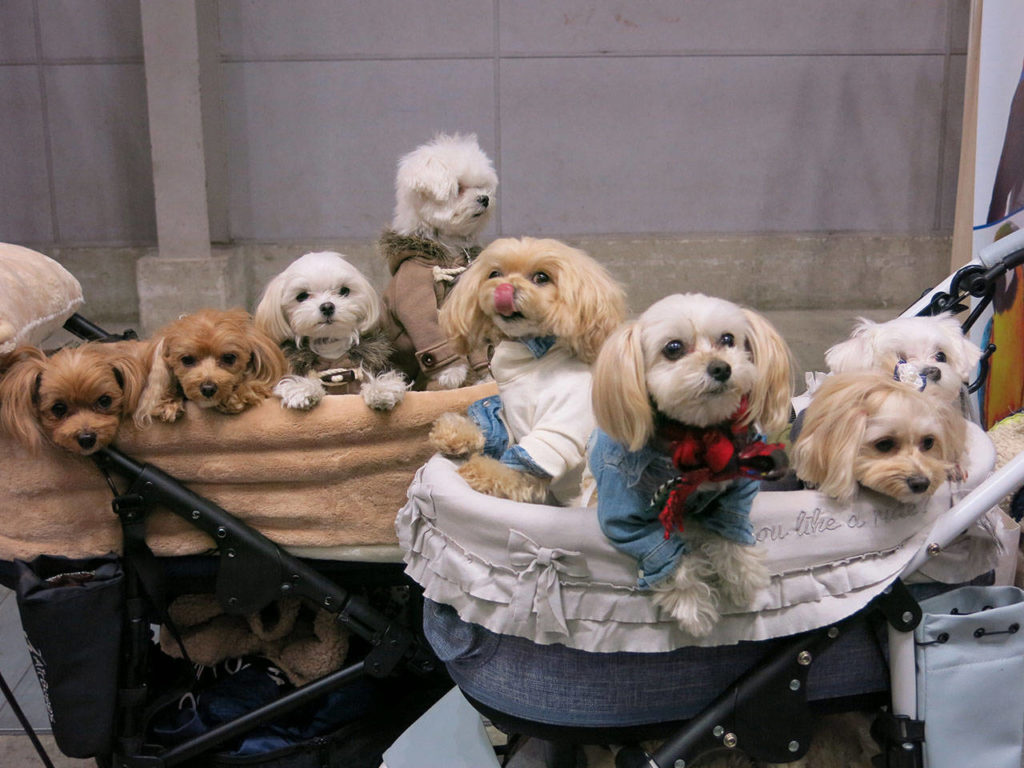By Simon Denyer
The Washington Post
YOKOHAMA, Japan — Ziggy sometimes seems like the only naked dog in the neighborhood.
He has a covering of curly white hair. But he doesn’t wear a jacket to make him look stylish, nor a coat to keep him dry and warm. He has no bandanna around his neck, nor a bow in his hair. He certainly doesn’t wear trousers, or dog diapers, and we don’t wheel him around in a stroller.
Bringing a dog to Japan is a cultural experience all of its own.
Pets are pampered from Paris to Portland, but this is a country that takes dog ownership to another level.
Pet owners are in a minority here, and broader society is not particularly tolerant. It can be hard for dog owners to rent apartments in Tokyo, let alone take their animals on public transport.
But take your pooch to Andy Cafe and Dog Salon in Tokyo. You’ll not only be allowed to sit with your pet, but you can offer him or her food designed to look like what you’re eating, even if it might taste a bit different.
There are mini-hamburgers, cheesecakes and quiche, bento boxes for dogs, and cakes made with chicken breast in the shape of bones.
On Valentine’s Day, why not treat your dog to a heart-shaped cake? Perhaps your dog could celebrate Easter with a bunny cake, or get into the Halloween spirit with a doggy doughnut.
Public transport isn’t welcoming. Dogs weighing more than 22 pounds aren’t allowed on trains or in taxis, and smaller ones must be carried in enclosed carry bags or crates.
But Japan Airlines offers special charter flights to domestic tourist destinations once a year that let dog owners bring their pets inside the cabin.
Dogs aren’t allowed off their leashes in Japanese parks, and there are very few dedicated dog runs. Instead, the apartment building in Yokohama, Wancott “Total Dog Service” offers a large indoor exercise area, as well as a gym with a hydrotherapy tank, a wobble board and a mini-treadmill, for rehabilitation from injuries and general fitness training.
For dogs that aren’t getting enough exercise, Wanwan Fitness in Tokyo offers a swimming pool, a balance ball and hurdles, and even aromatherapy massages.
But it’s not only the pampering that makes dog owners in Japan stand out.
Here, good manners and consideration for others have a high premium in society.
Dog owners always pick up their dog’s poop, without exception, but also often carry a bottle of water to squirt and wash down anything their pet has urinated on. It’s called “manner water.” Some take things a step further, laying down a mat to catch the waste before it even touches the ground.
Trash cans were largely removed from Japanese streets after a 1995 sarin gas attack on the subway. Dog owners have to take dog waste home and flush it down the toilet: A paper bag inside a plastic bag makes that an easier prospect.
But it’s the clothes and strollers that are the most obvious manifestation of dog culture-shock here.
At a fashion show during Yokohama’s Pet Expo 2019 last month, owners paraded their pets in an array of human clothes. There was a dog in green camouflage matching its owners’, and another in a knitted hat and cardigan; there were spaniels in black jackets and jeans, dogs looking cool in leather jackets and sunglasses, and even four canines in scout uniforms.
On the final day, Nobuyuki Masuyama, 45, won a prize with his dog Rei, a dwarf Spitz-Chihuahua crossbreed dressed in a yellow coat and jeans, shoes and socks, and, like his owner, a prominent pair of glasses.
A single man, Masuyama calls his dog a member of his family and admits he has an “uncountable” number of outfits for him to wear.
“Dogs have been anthropomorphized in Japan,” said Hisashi Ishiyama, chairman of the Japan Pet Food Association. “It’s the empty-nest syndrome. … People feel lonely, and a dog is an eternal baby, isn’t it?”
With Japan’s birthrate so low, and many elderly people living apart from their grown-up children, one might expect dog ownership to be rising. But it has actually fallen in the past four years, with 12.6 percent of households owning a total of 8.9 million dogs, according to data from INTAGE, a marketing research firm. That compares with roughly half of households owning dogs in the United States, according to the American Pet Products Association.
Ishiyama says that’s because it’s hard to overcome the hurdles associated with dog ownership in Japan, and only people who are really committed to owning dogs do so.
But he regrets that public dog shelters don’t give out abandoned dogs to people in their 60s, for fear that the dogs might outlive their owners — despite the proven health benefits that owning a dog confers.
The Washington Post’s Akiko Kashiwagi contributed to this report.
Talk to us
> Give us your news tips.
> Send us a letter to the editor.
> More Herald contact information.



























